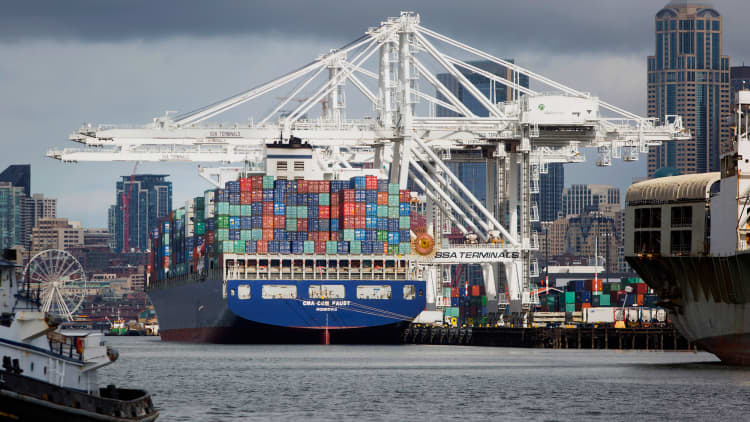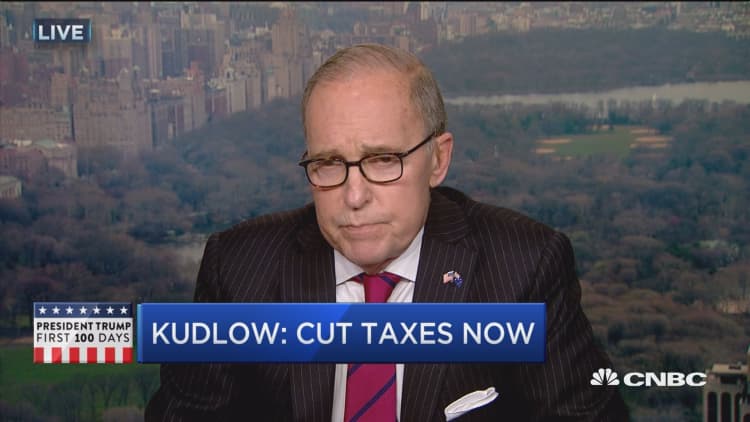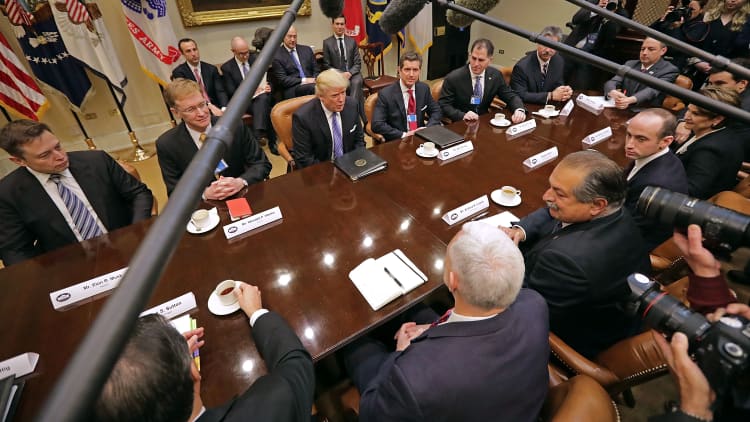
There's risk that Washington's plan to give Corporate America a big tax break could backfire and create a fat tax on consumers.
That's because the key way the House Republicans would pay for the cut in the corporate tax rate from 35 percent to 20 percent depends on a controversial border-adjusted tax, which in turn relies on a sharply rising dollar. The proposal would tax all imports into the U.S. at the corporate tax rate of 20 percent, and would exempt exports from any taxes at all.
Critics say it could create a jump in prices for everything from gasoline to TVs and blue jeans. Supporters say it could create jobs in America, and companies like exporters Dow Chemical have been talking positively about the tax.
The problem is that the plan relies on the dollar rising sharply — 25 percent — so that the cost of imported goods doesn't noticeably rise.
But that significant jump in the greenback required to neutralize the impact, seems to be at odds with the Trump administration, whose officials have talked down the U.S. dollar, saying it's too strong. The dollar has lost about 1.8 percent since Inauguration Day, in part due to those comments from Trump officials and President Donald Trump himself.
Whether the dollar would rise, as expected by the plan's proponents, is an unknown, according to a number of strategists. And it's a point of disagreement on Wall Street.
"We won't know the answer to that until we do it," said Bob Doll, chief equity strategist at Nuveen Asset Management. He also said it's unclear whether the proposal, floated by the House Ways and Means Committee, would be applied to all industries or if would be exemptions.
The border-adjusted tax, as currently proposed by House Republicans, is expected to generate more than $1 trillion over ten years to partially offset the tax cut. The destination-based tax would mean that companies would not deduct the costs of imported goods, and would not include export revenue in their tax base.
Wall Street has dissected and speculated about the tax but sees a relatively low chance of it passing. Big exporters like Boeing see it positively, but it's being opposed by retailers, like Target and Best Buy, who see a direct hit on their bottom line. Companies aligned on both sides have organized themselves.

The American Made Coalition says it represents 25 companies in manufacturing, energy, agriculture, technology and other industries that favor a border-adjusted tax. Wal-Mart, Target, Saks and other retailers have their own group - Americans for Affordable Products.
Goldman Sachs economists Thursday echoed what others have also worried about — the dollar may not appreciate completely, and there could be "short-run adjustment" frictions.
"In the U.S., these frictions include higher inflation that would disproportionately hurt low-income households; lower margins for importers in industries such as apparel and higher margins for exporters in industries such as aerospace; changes in trade flows, and a hit to net foreign assets," they wrote in a note.
The Goldman economists said the border adjustment could boost inflation by 0.8 percent in the first year but there could be effects in the range of 0.5 percent to 1.5 percent.
"The key assumption behind our estimate is that importers facing a higher tax bill would pass on some share of their cost increase to consumers, but import-competing domestic producers would not raise their prices as quickly, realizing that the prices of imports should eventually come back down. If the transition became very protracted, the domestic price level could rise more broadly," they wrote.
There could also be a ripple effect in the emerging world, where dollar-denominated debt could become much more expensive, and the stronger dollar could curb appetite for U.S. exports, the Goldman economists said. Credit Suisse strategists also wrote recently that if the dollar were to appreciate by 25 percent, as expected by tax writers, there would be a half percent hit to Asian GDP. The Asian economies most hurt would be Korea, Taiwan, Vietnam and Malaysia because they export durable goods and demand is more sensitive to changes in import prices.
But the border tax is not without its merits. Strategists say it would level the playing field for the U.S. because many countries around the world use a Value Added Tax.
David Woo, head of global rates and currencies at Bank of America Merrill Lynch, said with modifications, it could be an elegant solution to pay for tax reform, if it is phased in gradually.
"They're going to try to move in line with international taxation systems, like VAT. The U.S. will be doing what everybody else would be doing, and then the border adjusted tax is going to raise $1 trillion. It's not something you could basically just throw away. It's a lynch pin of the entire corporate tax reform," said Woo.
But he said there are some aspects that have not gotten much attention and could have consequences. "Most of Wal-Mart's contracts, whatever they import. the contracts are negotiated in U.S. dollars," as are the contracts of other importers, he said. "So from the point of view the dollar really goes up, they negotiated in dollars…the irony is we import more from China than anywhere else. The RMB would have to go down against the U.S. dollar. That is what Trump doesn't want." Trump has said China unfairly undervalues its currency, though it has been actively supporting the yuan since late last year.
"It's a difficult contradiction to reconcile. I'm optimistic the border adjustment tax will go through but not in this current state," said Woo.
There are questions being raised in Washington, where if it is perceived as a 'Wal-mart tax,' or tax on Wal-mart shoppers, it may lose some appeal. Sen. Orrin Hatch, head of the Senate Finance Committee, said Wednesday there are questions about whether the tax would burden consumers and businesses or be acceptable under international trade rules. He did not reject the idea of the tax but his comments suggested it may have difficulty passing the Senate. House Speaker Paul Ryan, however, says it's an important part of tax reform, and on Thursday he said serious talks on tax reform won't begin until the spring.
The stock market has risen, in part on hopes that tax reform will be a windfall for corporate earnings. The average S&P 500 company pays about a 25 percent corporate tax rate, and without the border tax there is no revenue to bring down that tax rate to the 20 percent level. Strategas has said without the border tax, the rate would get to about 25 percent.
"Hatch is now indicating that the Senate may pursue a separate tax reform bill from the House version, with the assumption being that a border adjustment tax cannot pass the Senate. That of course could change if Trump puts his weight behind the House bill, but we won't know that for a couple of weeks," wrote Strategas Dan Clifton in a note. Clifton, head of policy research, points out that the dollar is not reflecting the idea of a border tax, but some stocks are.
Besides retail, there would be a definite impact on the energy industry, if it is applied broadly. The border tax could drive up the cost of U.S. domestic crude, versus overseas oil, and even Canadian crude, half of all U.S. imports. It would also push up the price of gasoline at the pump, according to Citigroup, and there are some estimates it could be about $0.30 per gallon, as average retail prices jump 15 percent year over year. Refiners would have a mixed impact, with east coast refiners, seeing a negative impact because of their dependence on foreign oil.
"There are very clear winners and losers that come out of it as well," said Eric Lee, energy analyst at Citigroup. "The thing with oil, specifically, is it's all U.S. dollar denominated, so there isn't that dollar impact. It doesn't play the same way for oil or crude or gasoline. All in all, it raises domestic crude prices. WTI could be more expensive than Brent."
The U.S., as of November, was producing about 8.9 million barrels a day and was importing about 8.1 million barrels a day. North America has a tightly linked, complex maze of energy interconnections, and U.S. refineries buy oil by grade, not necessarily by geographical location of the source.
The balance between imports and exports would shift, and U.S. oil production could pick up even more, said Lee.
"Domestic crude producers can raise their prices until it matches the import price, or at least there's a balance," he said. There would be varied impacts by region. "Gulf coast, you probably have good access to domestic crude and probably exporting gasoline and diesel. You might see higher crude exports," he said. "It really artificially would raise exports out of the U.S. and would tend to put downward pressure on global prices and upward pressure on U.S. oil."
In a note, Citi analysts said: "With an assumed 20 percent corporate tax rate, it would imply a combined price shift of (about) $12 at $55 spot oil to close arbitrages. The lack of specificity in the current proposals makes pinpointing exact effects tricky, but it would undoubtedly be negative for the US oil consumer [individual and corporate], a positive for US oil production and would likely create a spectrum of winners and losers in the refinery landscape."



